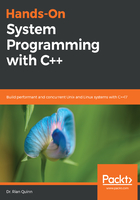
Initializers in if/switch statements
In C++17, it is now possible to define a variable and initialize it in the definition of an if and switch statement, as follows:
#include <iostream>
int main(void)
{
if (auto i = 42; i > 0) {
std::cout << "Hello World\n";
}
}
// > g++ scratchpad.cpp; ./a.out
// Hello World
In the preceding example, the i variable is defined and initialized inside the if statement using a semicolon (;) inside the branch itself. This is especially useful for C- and POSIX-style functions that return error codes, as the variable that stores the error code can be defined in the proper context.
What makes this feature so important and useful is that the variable is only defined when the condition is met. That is, in the preceding example, i only exists if i is greater than 0.
This is extremely helpful in ensuring that variables are available when they are valid, helping to reduce the likelihood of working with an invalid variable.
The same type of initialization can occur with switch statements as follows:
#include <iostream>
int main(void)
{
switch(auto i = 42) {
case 42:
std::cout << "Hello World\n";
break;
default:
break;
}
}
// > g++ scratchpad.cpp; ./a.out
// Hello World
In the preceding example, the i variable is created only in the context of the switch statement. Unlike the if statement, the i variable exists for all cases, meaning the i variable is available in the default state, which could represent the invalid state.